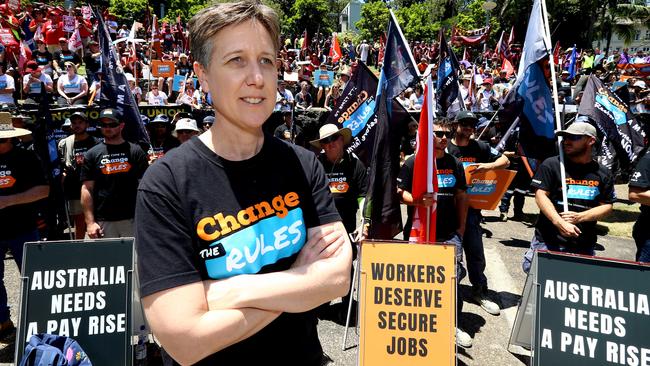Coronavirus pain hits labour force
Coronavirus has thrown workers and bosses into crisis together.

Peter Strong endured Paul Keating’s “recession we had to have” and the global financial crisis, but says he has witnessed nothing like the shockwaves being felt by small business from the unfolding coronavirus epidemic.
“I have not seen anything this bad as a health crisis and an economic crisis,” Strong, the chief executive of the Council of Small Business Organisations of Australia, tells Inquirer.
“Certainly, tens of thousands of businesses will go under. Many should reopen but some will definitely not come back. There is no doubt they will go bankrupt, but there are others who, if they make the decision quick enough, can save the farm and the family home and reopen at some stage in the future when things get better.
“The positive difference to other (downturns) I have been through is with this one we know there is an end date. The more disturbing thing is we are going to confront huge change in a very short time. A lot of people being pushed out of jobs, a lot of businesses folding. That’s the biggest problem.”
Industry smashed
As each hour and day passes, the fragility of the national labour market is being exposed.
Finance Minister Mathias Cormann said on Tuesday morning what most employers already knew; that many businesses will close and many workers will lose their jobs. An hour later, Qantas announced it would cut 90 per cent of international flights and 60 per cent of domestic capacity until the end of May, sending another tremor through the aviation sector and prompting unions to seek urgent talks with Scott Morrison to try to ensure thousands of aviation jobs were protected.
“This is not the long-term decline of an industry but a potentially short, sharp hit that will require workers to be ready to go back to their jobs,” says Transport Workers Union national secretary Michael Kaine. “In the meantime, they need to be able to look after their families.”
Industry after industry is being smashed. To underline what lies ahead, data released on Tuesday showed that business conditions in the manufacturing sector have already been hit by the largest single-quarter decline in 20 years. The data covered a period up to March 3, two weeks before the latest economic carnage.
In the construction sector, major companies are expressing concern about how to keep employees, subcontractors and apprentices in work if building activity sharply contracts.
Denita Wawn, chief executive of Master Builders Australia, says support for 395,000 building employers will be crucial to keeping people in work as they employ 1.8 million Australians and train more than 50,0000 apprentices each year.
“It’s crucial that governments act now because we know from previous downturns that the labour market lags well behind the rest of the economy when it recovers: it took more than seven years for the employment rate to bounce back after the 1990s recession,” Wawn says. “Further stimulus is needed to activate the $17.6bn package announced by the federal government last week because businesses will only take up those stimulus measures if they are confident they have a pipeline of work over the next few months.”
CFMEU construction division national secretary Dave Noonan says project schedules could be impacted and jobs stopped if there were supply chain interruptions. While backing the need for special leave for workers impacted by coronavirus, he says the Construction Forestry Maritime Mining and Energy Union was “not advocating mass closures of jobs”.
“We think it’s important to try and keep the industry ticking over but, of course, we will support any measures which are genuinely trying to prevent the spread of the virus,” Noonan says.
ACTU demands
Secretary of the peak union body, Sally McManus, says the government’s refusal to provide paid leave to casual and contract workers impacted by coronavirus represents a “serious gap” in its response to the epidemic.
In a new letter to the Prime Minister on Monday, McManus wrote: “It is essential for public health that if workers need to self-isolate that they do not face a financial penalty. If working people are forced to choose between going to work sick or being able to pay their bills and feed their families, then we are creating an unacceptable risk to public health.”
Federal Attorney-General and Industrial Relations Minister Christian Porter restated the government’s opposition to the union push, saying the support for workers should be provided through the welfare system.
He welcomed the commitments from major private-sector employers, as well as the Australian Public Service Commission, for paid leave for casuals impacted by the virus. As the pandemic evolves, he says, demand in some areas of the economy for casual labour will decline, while demand in other areas will increase.
“Many people may require help in the challenging times ahead, because they find they are not able to work or because they have experienced unemployment due to changed economic conditions,’’ Porter says.
“The best assistance mechanism is the welfare system, because of its proven ability to deliver income support to affected workers. This is the most effective way to ensure income support reaches those in need as simply and quickly as possible, with regular waiting periods waived.
“As Australians focus on and work together to deal with this health crisis, it is not the time for wholesale structural change to the industrial relations system in Australia for one group of workers. What those most affected really need is income support until things improve.”
Major employers, including Woolworths, Telstra and Wesfarmers-owned businesses such as Kmart and Target, have committed to paying up to 14 days’ leave to casuals if they are unfit for work due to the coronavirus.
Crown casino made a similar commitment on Tuesday but McManus criticised Coles, which while pledging to employ 5000 extra casuals has not committed to providing paid leave to existing casuals.
The government says casuals can access sickness payments through the welfare system and last week waived the waiting period. But unions want a specific commitment to paid leave announced in the second stimulus package.
McManus says many workers are being stood down and are now without any pay. “This has left many working people without any income at a time when the economy, let alone their families, can least afford it,” she says.
Australian Industry Group chief executive Innes Willox says the coronavirus is “rightly causing many people to feel nervous about their income and employment prospects”.
“Anecdotally, we are hearing about workers in the more discretionary services sectors already having their hours and shifts reduced,” Willox says.
Many different types of travel, entertainment and other services have closed or reduced their operations. “But we are also hearing about food retailers, healthcare providers, cleaning contractors and parts of local manufacturing stepping up their immediate recruitment efforts in a bid to keep their supply chains open and flowing.
“We are even hearing about onshoring of local manufacturing for the construction industry and for transport equipment contracts, due to the widespread disruptions to global supplies and freight, and possibly encouraged by the falling Australian dollar.”

‘I lost my gig’
Among the worst-hit are hundreds of performing arts and production companies, and tens of thousands of workers impacted by the mass shutdown of events. Live Performance Australia chief executive Evelyn Richardson says the industry is “counting a rapidly rising toll in cancelled shows, festivals and events, job losses, venue closures and lost revenue”.
In less than 48 hours, the I Lost My Gig campaign recorded more than $47m worth of lost income by small to medium-sized businesses and independent contractors who have had jobs cancelled across the creative industries. An estimated 20,000 work opportunities have been cancelled, impacting more than 190,000 people.
“The economic and cultural cost of the coronavirus shutdown for the live performance industry is likely to exceed more than half a billion dollars and thousands of jobs over coming months,” Richardson says.
“The live performance industry is on the frontline of the public health war on coronavirus and needs the full support of government if it is to have any chance of coming through the other side of this unprecedented crisis period.
“Many of our smaller to medium-sized companies simply do not have the financial reserves to survive an extended shutdown period. They may be lost to the industry forever.
“If there are no shows and no ticket sales, there is no income to support arts companies, their performers, artists and crew or their huge army of casual employees who support their production, technical, ticketing, hospitality and venue operations.”
Media Entertainment & Arts Alliance chief executive Paul Murphy says the $2.5bn live performance industry is characterised by disproportionately high levels of casual and contract employment, and a workforce that does not have recourse to paid leave entitlements.
Insecure employment is also rampant through employment at sporting events, with these employees impacted by crowd bans and potential season delays.
“Due to the intermittent nature of their employment, many workers in the arts and entertainment industries are already on the economic margins and could be pushed into poverty without the ability to take paid leave,” Murphy says.
“Because the sector has such high levels of casual and contract employment, MEAA supports the call of Live Performance Australia for specific support for the arts and entertainment industries, and for special consideration to be given to extending a temporary 50 per cent wage subsidy for employers of apprentices to help keep people employed.”
Small-business woes
While welcoming the offer by some production companies to provide casuals with paid sick leave if they are impacted by the coronavirus, Murphy says the government must urgently review its decision to rule out providing up to two weeks of paid special leave to all impacted workers.
From a small business perspective, Strong nominates events planning as an industry that will be without work for three to four months. But the casualties are widespread.
Stephanie Dellios, 26, says the viral outbreak saw her lose her chance to win her dream job at a design agency. She went through three rounds of interviews, and was the preferred candidate before being told the job offer was off as the company’s customers had cancelled jobs and postponed work, putting its future in doubt.
“I know that I’m fortunate, I know that I can get jobs that don’t require me to leave home, but there are so many people who can’t do work from home and they’re screwed,” she says.
“All of my friends that have anything to do with customer service, I have friends in hospo and council customer services, are all scared for their jobs.”
Strong says small businesses are going to have to make difficult decisions quickly rather than suffer a slow commercial death.
“There is going to be a big hit. People will be laid off, retrenched. There will be businesses closing,” he says.
“Most small businesses hate the thought of sacking someone, because it just hurts, but you have got to make a hard decision: in the end, the welfare sector will look after your staff and you have to make sure you, your family and your house survive as best you can.
“Hard decisions are going to have to be made but, if they are made, it means many businesses should be able to reopen or trade on skeleton staff.”
Additional reporting: David Ross




To join the conversation, please log in. Don't have an account? Register
Join the conversation, you are commenting as Logout